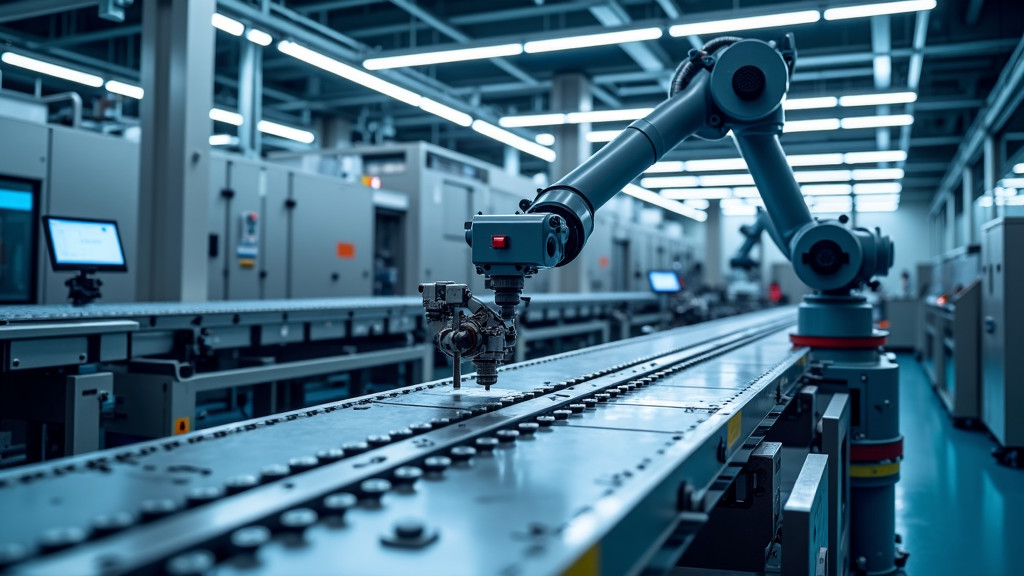Understanding the Role of an Automation Technician
Machines now orchestrate complex industrial processes, optimizing efficiency and productivity with minimal human intervention. At the heart of this technological marvel stands the automation technician, a modern-day maestro of mechanized systems. These skilled professionals are the unsung heroes of our increasingly automated world, blending technical expertise with problem-solving prowess to keep the gears of industry turning smoothly.
What exactly does an automation technician do? Far more than just pushing buttons or flipping switches, these technicians are the architects and guardians of automated systems that power everything from manufacturing plants to energy facilities. They install, maintain, and repair a vast array of sophisticated machinery, ensuring that robots, conveyor belts, and computer-controlled equipment operate in perfect harmony.
Automation technicians play a pivotal role in enhancing system efficiency and streamlining processes. Their expertise is crucial in troubleshooting complex issues, often under pressure, to minimize costly downtime. As reported by industry experts, the goal of industrial automation is to work smarter, faster, and more efficiently, and automation technicians are at the forefront of this technological revolution.
The demand for skilled automation technicians is skyrocketing, with the Bureau of Labor Statistics projecting a 10% growth in employment for industrial engineering technicians, including automation specialists, from 2020 to 2030. This surge reflects the increasing reliance on automated systems across various sectors, from automotive manufacturing to pharmaceutical production.
This article explores the fascinating world of automation technicians, their key responsibilities, the skills they need to thrive, and the exciting career opportunities that await in this dynamic field. Whether you’re considering a career change or simply curious about the invisible hands that keep our automated world running, prepare to be intrigued by the essential role of automation technicians in shaping our technological future.
Key Skills Required for Automation Technicians


Technicians in industrial automation need a diverse skill set to excel. Key competencies include PLC programming, robotics proficiency, and electrical troubleshooting expertise.
PLC programming is essential for automated systems control. Technicians skilled in languages like ladder logic can create precise programs for machinery. For instance, a technician might program a PLC to manage a packaging line, ensuring efficient sorting, wrapping, and boxing of products.
Robotics skills are necessary for integrating and maintaining automated equipment. This includes understanding robot kinematics, end-of-arm tooling, and safety protocols. A technician with strong robotics skills can enhance a welding robot’s performance on an automotive assembly line.
Electrical troubleshooting is vital for system uptime. Technicians must diagnose and resolve issues in complex electrical systems quickly. This may involve using a multimeter to trace a fault in a motor control circuit or interpreting error codes from a drive system to restore operations swiftly.
Reading and interpreting technical schematics is also crucial. Schematics act as roadmaps for complex systems, enabling technicians to navigate intricate electrical and mechanical layouts. This skill speeds up both installation and repair processes.
Practical Applications of Automation Skills
Consider a modern bottling plant where an automation technician might:
- Adjust the timing of a bottle-filling sequence using PLC programming
- Recalibrate robotic arms for a new bottle design
- Troubleshoot electrical faults causing stoppages in the labeling machine
- Use schematics to replace a faulty sensor in the quality control checkpoint
These skills ensure high performance and efficiency of automated systems across industries. Technicians not only maintain production lines but also contribute to improvements in speed, accuracy, and reliability.
Automation is about understanding the entire system and how each component interacts to create seamless operations.
As technology advances, automation technicians must update their skills. Emerging areas like Industrial Internet of Things (IIoT) and data analytics are becoming more important, expanding the scope of what it means to be a skilled automation technician today.
Common Industries Employing Automation Technicians


A sleek robotic arm performing assembly operations on a production line in a high-tech manufacturing facility. – Artist Rendition
Automation technicians are increasingly sought after in industries like manufacturing, food processing, and automotive, where businesses aim to enhance efficiency through advanced technologies. These sectors are major employers of skilled professionals.
Manufacturing: The Automation Frontier
In manufacturing, automation technicians optimize production lines and enhance efficiency. They implement and maintain robotic systems and programmable logic controllers (PLCs). Their work reduces downtime and improves product quality. For example, in electronics manufacturing, they set up and troubleshoot automated circuit board assembly lines.
Automation’s impact on manufacturing is significant. McKinsey reports that about 60% of manufacturing activities could be automated, presenting growing opportunities for technicians.
| Opportunity | Description |
|---|---|
| Design-for-Automation | Plan for automation during initial product design phases to ensure compatibility and reduce costs. |
| Industrial Process Automation | Utilize IIoT technologies to enhance efficiency, reduce errors, and improve product quality. |
| Self-Calibration Capabilities | Enable robots to perform routine self-checks and recalibrate automatically for consistent quality. |
Food Processing: Serving Up Efficiency
The food processing industry uses automation to meet demands for safety, consistency, and productivity. Technicians work on systems like automated sorting and packaging lines. They help maintain hygiene standards and increase output, programming vision systems for inspection or setting up robotic packaging systems.
Automation in food processing is accelerating, with the global market expected to grow due to increased safety and efficiency needs.
Automotive: Driving Innovation
The automotive industry leads in automation, employing technicians on assembly lines, robotic welding, and paint shops. They ensure precision and consistency in vehicle production, programming robots and maintaining quality control systems.
Automation’s role in the automotive sector is evolving, especially with electric vehicle production, creating new opportunities for technicians.
Bridging Industries with Versatile Skills
While manufacturing, food processing, and automotive are major employers of automation technicians, their skills are transferable. Opportunities exist in pharmaceuticals, logistics, and entertainment. The need for professionals to design and maintain complex systems is common across these industries.
For those considering a career as an automation technician, the diversity of industries offers specialization and growth opportunities. Whether ensuring smooth car assembly or maintaining food processing safety, technicians play a vital role in shaping the industry’s future.
Educational Pathways and Certifications for Automation Technicians
The automation technology sector is evolving rapidly, requiring a strong educational foundation and continuous skill development for aspiring technicians. Many start their careers with formal education in electrical engineering, mechanical engineering, or specialized automation technology programs.
A degree in these fields provides essential knowledge of control systems, programming languages, and industrial processes. However, the learning journey extends beyond a diploma. The dynamic nature of automation requires ongoing learning and professional growth.
To excel, technicians often enhance their education with specialized certifications. These credentials validate expertise and significantly improve job prospects in a competitive market. A notable certification is the ISA Certified Automation Professional (CAP), offered by the International Society of Automation.
The CAP certification demonstrates comprehensive knowledge of automation and control systems, covering areas like system design, integration, and project management. Employers often regard this certification as a mark of excellence, leading to advanced roles and greater responsibilities.
Beyond the CAP, other valuable certifications include the Certified Control Systems Technician (CCST) program from ISA and vendor-specific certifications from Siemens and Rockwell Automation. Each adds unique skills, enhancing versatility and market value.
| Certification | Provider | Best For | Prerequisites | Price | Duration |
|---|---|---|---|---|---|
| Certified Software Test Automation Specialist | IIST | Software Test Engineers, QA Automation Engineers | 3 years of experience in software testing or related field | N/A | N/A |
| ISTQB Advanced Level Test Automation Engineer | ISTQB | Test Automation Engineers, QA Automation Engineers | ISTQB CTFL certification, 3 years of testing experience | N/A | 30-40 hours |
| Advanced Test Automation Engineer Certificate | BCS | Software Test Automation Engineers, QA Automation Engineers | 18 months of practical experience, BCS ISTQB Foundation Certificate | N/A | N/A |
| Certified Selenium Engineer | Selenium United | QA Engineer, Test Automation Engineer | Basic programming knowledge, understanding of web technologies | N/A | N/A |
| Certified Mobile Testing Engineer | GAQM | Mobile Application Testers, QA Analysts | Understanding of software testing principles, mobile OS experience | N/A | N/A |
Continuous education isn’t just about staying relevant; it’s about driving innovation in automation. Every new skill you acquire is a tool to shape the future of industry.
In this advancing field, the importance of continuous education is crucial. Automation technicians must stay updated with emerging technologies, from artificial intelligence and machine learning to the Internet of Things (IoT). Attending workshops, participating in online courses, and engaging with professional networks are key strategies for staying at the forefront of automation technology.
Your educational journey in automation is ongoing. Each certification and skill mastered is a step towards becoming an indispensable asset in industrial automation. Are you ready to embrace the challenge and unlock your full potential as an automation technician?
The Future of Automation Technician Careers
Automation technicians are at the forefront of industrial change, shaping the modern industrial landscape. The rapid growth of automated processes across industries has made these skilled professionals pivotal.
Continuous upskilling is essential in this dynamic field. The automation landscape evolves quickly, with new technologies emerging almost daily. Technicians committed to lifelong learning not only keep pace but also drive innovation.
For aspiring and current automation technicians, this means embracing adaptability and curiosity. As Dinesh Nirmal, General Manager for IBM Automation, notes, understanding both technical aspects and broader business operations is crucial. This holistic knowledge allows technicians to apply automation solutions effectively, maximizing efficiency and productivity.
Looking ahead, industries will face complex challenges. From tackling labor shortages to optimizing resource allocation, automation technicians will devise innovative solutions. Those blending technical expertise with creative problem-solving will be in high demand across sectors like manufacturing and healthcare.
The future for automation technicians is promising but demands a commitment to growth. By staying ahead of technological advancements and honing diverse skills, these professionals will not just navigate future challenges—they’ll shape the industry’s future. Are you ready to become a driving force in automation?
Last updated:
Disclaimer: The information presented in this article is for general informational purposes only and is provided as is. While we strive to keep the content up-to-date and accurate, we make no representations or warranties of any kind, express or implied, about the completeness, accuracy, reliability, suitability, or availability of the information contained in this article.
Any reliance you place on such information is strictly at your own risk. We reserve the right to make additions, deletions, or modifications to the contents of this article at any time without prior notice.
In no event will we be liable for any loss or damage including without limitation, indirect or consequential loss or damage, or any loss or damage whatsoever arising from loss of data, profits, or any other loss not specified herein arising out of, or in connection with, the use of this article.
Despite our best efforts, this article may contain oversights, errors, or omissions. If you notice any inaccuracies or have concerns about the content, please report them through our content feedback form. Your input helps us maintain the quality and reliability of our information.
